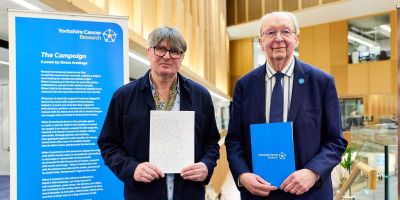Leeds scientist wins £125k funding to develop new protein-level strategies for fighting lung cancer.

Dr Alexander Garvin has been awarded £125,000 to improve Lung cancer detection, as part of a £7.6 million national investment in scientific leaders.
In its largest-ever funding initiative for early-career researchers, the Academy of Medical Sciences is investing £7.6 million to tackle urgent health challenges from Alzheimer’s disease, cancer and obesity to addiction and climate change impacts on health.
Dr Alexander Garvin, from the School of Molecular and Cellular Biology, is one of 62 researchers selected nationwide to receive the Academy’s Springboard Award. His work will focus on how to inhibit cancer-supporting proteins called SENPs (SUMO Proteases), found in a form of lung cancer known as lung squamous cell carcinoma or LUSC. Most people treated for LUSC are taking drugs developed many years ago. There are currently no new effective drugs for people with LUSC.
Dr Garvin said, “We know that a subset of LUSC cancers make more of certain proteins. This project will look at proteins called SENPs which clip off a tag called SUMO (Small Ubiquitin-like Modifiers) from other proteins. In my previous work, I’ve shown that some of these SENPs are “repurposed” by cancer cells to resist the drugs used to kill them. LUSC cancers make much more SENPs, but we think that if we make drugs that stop SENPs from working, we can better treat cancer.”
Each of the 62 selected scientists from 41 UK institutions will receive between £100,000 and £125,000, along with mentorship and career development support, to help establish independent research careers and drive innovation in biomedicine.
The benefits for cancer patients are clear, explained Dr Garvin, “This should make chemotherapy work better and stop cancers from returning. We think other cancers from the Ovary, Cervix and Throat behave in the same way to LUSC, so this research could help many other people with cancer by uncovering a shared weak spot.”
This should make chemotherapy work better and stop cancers from returning.
The Academy’s Springboard programme is supported by the UK Government’s Department for Science, Innovation and Technology, Wellcome, and the British Heart Foundation. Launched in 2015, it has now invested £43.8 million to accelerate the careers of future scientific leaders across the UK.
Dr Sharib Ali, from the School of Computer Science at the University of Leeds, is also a recipient of Springboard funding, which he will use to develop AI solutions for early bowel cancer detection.
UK Science Minister Lord Vallance said: “Research supported by the Springboard programme can help to address some of the most pressing health challenges, like antimicrobial resistance and cancer, by giving early-career researchers across the UK the opportunity to test their ideas.
“Through this programme we are supporting the next generation of researchers to lead their own ground-breaking research so that the UK can continue to be a pioneer in medical science.”
Applications for the next round of Springboard funding are now open, with institutions able to nominate candidates by the end of April 2025.
Image: Squamous cell carcinoma of the lung: Wikimedia Commons.
Further information




